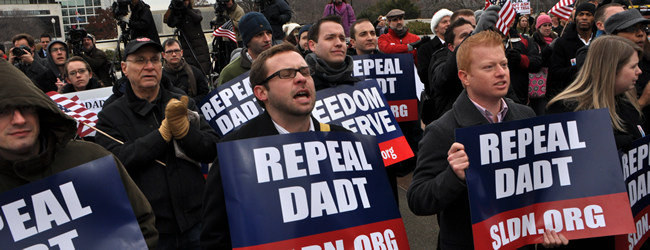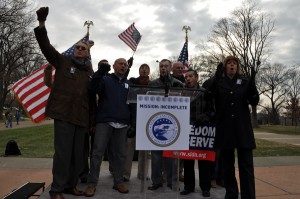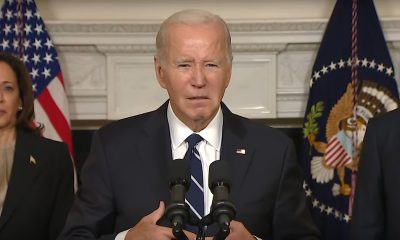National
‘Don’t Go Home!’ until ‘Don’t Ask’ is done
Demonstrators demand Senators extend session

Supporters of open service in the U.S. military rallied on Capitol Hill Friday to urge the Senate to stay in session for as long as needed until lawmakers repeal “Don’t Ask, Don’t Tell.”
Braving the December cold, around 100 participants gathered near the U.S. Capitol at the Upper Senate Park for the event, which was organized by the Servicemembers Legal Defense Network.
Those in attendance shouted the refrain “Don’t Go Home!” as they demanded that lawmakers continue work on Capitol Hill until “Don’t Ask, Don’t Tell” is repealed.
The rally comes in the wake of a devastating defeat that supporters of “Don’t Ask, Don’t Tell” repeal suffered on Thursday when the Senate failed to move ahead with major defense legislation containing repeal language by a vote of 57-40, three votes short of the 60-vote threshold necessary to end a filibuster.
Aubrey Sarvis, executive director of the Servicemembers Legal Defense Network, told the crowd the vote represented a setback, but said supporters of repeal have “reported back for duty.”
“In this lame duck, we speak everyday for all LGBT service members as they fight for our freedom,” Sarvis said. “In this Congress, we raise our voices as one and say, ‘Senators, kill this law, kill this law before you go home!'”
A number of veterans and current service members — gay and straight — addressed the rally and called for an end to the military’s gay ban.
Mike Almy, a gay former Air Force communications officer who was discharged in 2008 under “Don’t Ask, Don’t Tell,” also called on the Senate to stay in session until work is done on lifting the military’s gay ban.
“The Senate wants … to go home to their families and not do their duties and sit by warm fireplaces comfortably in their homes for Christmas while the work remains unfinished,” Almy said. “If I can serve overseas in harm’s way for four Christmases defending our nation, the Senate can certainly do the same.”
Senate Majority Leader Harry Reid (D-Nev.) has set Dec. 17 as the target date for adjournment for the Senate, although some lawmakers, including Sens. Joseph Lieberman (I-Conn.) and Mark Udall (D-Colo.), have said they’re willing to stay in session through the week before Christmas to repeal “Don’t Ask, Don’t Tell.”
Ret. Maj. Gen. Dennis Laich, who’s straight served in the Army for 35 years, said repeal of “Don’t Ask, Don’t Tell” is needed because the ban compromises the integrity of the U.S. military.
“‘Don’t Ask, Don’t Tell’ acknowledges that gays and lesbians serve in our military, but pretends they’re not there,” he said. “It destroys the values of that institution and on which it is based.”
Should the Senate not repeal “Don’t Ask, Don’t Tell,” Laich predicted what he called a “Spartacus moment” in which the estimated 66,000 gay and lesbian people serving in the military would declare their sexual orientations under the current law.
“How much does it cost to process the discharge of 66,000 service members?” Laich said. “How much does it cost to recruit and train their replacements? How long will it take to recruit and train those replacements? And how vulnerable will America be during this self-imposed national security crisis?”
Speakers at the rally had particularly strong words for senators who were among the “no” votes on Thursday preventing the “Don’t Ask, Don’t Tell” legislation from coming to the Senate floor.
Almy, an Ohio native whose family still lives in the state, said he was particularly disappointed in Sen. George Voinovich’s (R-Ohio) decision to vote against the legislation. The senator was considered a swing vote on moving forward with “Don’t Ask, Don’t Tell.”
“Yesterday, you shamed me with your vote as well as the rest of the Ohio veterans,” Almy said. “This is going to be your legacy. You are on the wrong side of history here Sen. Voinovich. I call on you here specifically to stay here in Washington and not leave.”
Two speakers who hailed from West Virginia also had harsh words for Sen. Joe Manchin (D-W.Va.), the only Democrat who voted against the motion to proceed Thursday on “Don’t Ask, Don’t Tell” repeal legislation.
Sgt. Jared Towner, a straight member of the West Virginia Army National Guard, said the “very, very established progressive youth element” in his state is disappointed in Manchin for his vote and could decline to back him when he’s next up for election in two years.
“We are the people that are going to be there — or we are the people that are not going to be there — in 2012,” Towner said. “You have to be there for us.”
Former Army Sgt. Pepe Johnson, a field artilleryman and Clarksburg, W.Va., native who was discharged under “Don’t Ask, Don’t Tell” in 2003, said he was “embarassed” because Manchin “decided to be a lone ranger” and vote against repeal.
“He said he’d only been in office for three weeks, so he didn’t have a chance to hear from the people of West Virginia,” Johnson said. “Well, Joe Manchin, if you can’t hear now, you better get a hearing aide!”
Many participants echoed the general tenor of the rally that Congress should stay in session for the time that’s needed to repeal “Don’t Ask, Don’t Tell” before going home.
Toby Quaranta, 25 and a gay D.C. resident, said he participated in the rally because he wants “people everywhere to know” that supporters of “Don’t Ask, Don’t Tell” repeal don’t want lawmakers to adjourn until the law is off the books.
“I think the Senate has a responsibility to the service members and to the people who just re-elected a lot of them to make sure that they get their business done before they leave town,” Quaranta said.
Bridget Geraghty, 25 and a lesbian D.C. resident, expressed frustration that the Senate was unable to act on “Don’t Ask, Don’t Tell” repeal when the vote came before the chamber on Thursday.
“I was seriously disappointed, but I guess not really surprised,” she said. “It’s never a surprise when Republicans don’t do what they’re supposed to do, and I think it was ridiculous that they are not letting this happen.”
One group of rally participants held up a banner during reading “In memory of Seaman August Provost, 1979-2009: All LGBT employees of the Department of Defense deserve EQUAL RIGHTS!”
Provost, a gay Navy seaman stationed at Camp Pendleton, Calif., was found dead on base last year and was possibly murdered because of his sexual orientation. He reportedly had complained to family members that was being harassed before he was killed.
Also among the rally participants was Rea Carey, executive director of the National Gay & Lesbian Task Force. Following the rally, she told the Blade she was “extremely disappointed” in the Senate vote on Thursday, but expected repeal advocates to continue toward their goal.
“I’m pleased that there are senators who are going to continue to push in this lame duck, and all of us at this rally and elsewhere around the country are going to push with them,” she said.
Many repeal advocates are pinning their hopes on new stand-alone legislation that Lieberman introduced in the Senate following the defeat on Thursday of the fiscal year 2011 defense authorization bill. The new stand-alone measure is identical to the repeal provision in the defense legislation.
Following the rally, Sarvis expressed optimism about the chances of passing the stand-alone repeal legislation in the lame duck and said repeal advocates are working to come up with 60 votes to move forward with the legislation in the Senate.
“The defense authorization bill, as a vehicle, became stale for a number of reasons,” he said. “Some senators talked about process or the procedure. I think our chances may well improve on a clean bill — clean in the sense of new introduction.”
Sarvis said attaching repeal language to the continuing resolution that Congress will soon vote on to extend funding for the U.S. government is another option on the table.
Still, Sarvis said using this measure as a vehicle for repeal would be “one of the last opportunities” for legislatively ending the military’s gay ban this year.
“Normally, the CR sometimes moves sometimes literally in the final hours,” Sarvis said. “So that is clearly an option that is out there. That’s why SLDN has put it on the table.”
National
House Republicans propose steep cuts in federal AIDS budget
Advocacy groups say move would eliminate ‘Ending HIV Epidemic’ initiative

The Republican-controlled U.S. House Subcommittee on Labor, Health, and Human Services, Education, and Related Agencies approved a spending bill on June 26 that calls for cutting at least $419 million from federal AIDS programs that AIDS activists say would have a devastating impact on efforts to greatly reduce the number of new HIV infections by 2030.
The subcommittee’s proposed bill, which includes billions of dollars in cuts in a wide range of other federal health, education, and human services related programs, is scheduled to be considered by the full House Appropriations Committee on July 10. Officials with AIDS advocacy groups say they are hopeful that the full committee, like last year, will refuse to approve the proposed cuts in the AIDS budget.
The proposed GOP cuts would eliminate $214 million from the U.S. Centers for Disease Control and Prevention’s HIV prevention programs, $190 million from the Ryan White HIV/AIDS Program, and $15 million from the Department of Health and Human Services Secretary’s Minority HIV/AIDS Program.
Activists say the impact of those cuts would kill the federal government’s Ending the HIV Epidemic initiative, which among other things, calls for reducing the number of new HIV infections in the U.S. by 75 percent by 2025 and by 90 percent by 2030. The activists point out that ironically the Ending the HIV Epidemic initiative was launched during the administration of President Donald Trump.
“Instead of providing new investments in ending HIV by increasing funding for testing, prevention programs, such as PrEP, and life-saving care and treatment, House Republicans are again choosing to go through a worthless exercise of cutting programs that the American people depend on and will never pass,” said Carl Schmid, executive director of the HIV + Hepatitis Policy Institute.
“While we vigorously fight these cuts, we look forward to working with the entire Congress in a bipartisan fashion on spending bills that can actually become law,” Schmid said in a statement.
Schmid noted that the bill also includes provisions known as “policy riders” that would take away rights and protections from women, such as access to birth control and abortion, and for minorities, including LGBTQ people.
According to a statement released by the office of Rep. Rosa DeLauro (D-Conn.), who is the ranking minority member of the House Appropriations Committee, one of the policy riders would “block the Biden administration’s policies to ensure nondiscrimination on the basis of gender identity and sexual orientation.’ The statement says another policy rider would “prevent policies or programs intended to promote diversity, equality, or inclusion.”
Most political observers believe the Democratic-controlled U.S. Senate would also kill the GOP proposed policy riders and cuts in the AIDS budget if the full Republican-controlled House were to approve the budget bill passed by the appropriations subcommittee.
Rep, Tom Cole (R-Okla.), who serves as chair of the full House Appropriations Committee, released a statement on June 27 defending the subcommittee’s bill and its proposed spending cuts. “The bill provides appropriate and fiscally responsible funding to ensure these departments can continue to perform their core missions while also acknowledging the fiscal realities facing our nation,” he said.
“Importantly, the bill pushes back on the Biden administration’s out-of-touch progressive policy agenda, preventing this White House from finalizing or implementing controversial rules or executive orders,” Cole said in his statement. “It also preserves long standing bipartisan policy provisions protecting the right to life.”
U.S. Supreme Court
Concern over marriage equality in US grows two decades after first Mass. same-sex weddings
Gay and lesbian couples began to marry in Bay State in 2004

Two decades after Massachusetts became the first state to legalize same-sex marriage, a new study reveals both significant progress and ongoing challenges for married LGBTQ couples in the U.S., with a growing sense of insecurity about the future of their rights.
The Williams Institute at UCLA School of Law surveyed 484 married same-sex couples from all 50 states and D.C. The study, released Monday, marks the 20th anniversary of legal same-sex marriage in the U.S.
Researchers found that 93 percent of respondents cited love as a primary reason for marrying, with 75 percent also mentioning legal protections. Over 83 percent reported positive changes in their sense of security, and 74.6 percent noted improved life satisfaction since marrying.
However, the study also highlighted persistent discrimination and growing concerns about the future. About 11 percent of couples who had a wedding reported facing prejudice during the planning process.
Alarmingly, nearly 80 percent of respondents expressed concern about the potential overturning of the 2015 Obergefell v. Hodges decision, which legalized same-sex marriage nationwide. This anxiety has been exacerbated by initiatives like Project 2025, a conservative policy blueprint that some fear could roll back LGBTQ rights if implemented.
The possibility of a former President Donald Trump victory in the upcoming election has further intensified these concerns. Many respondents cited Trump’s previous U.S. Supreme Court appointments and his statements on LGBTQ issues as reasons for their apprehension. One participant stated, “The thought of another Trump presidency keeps me up at night. We’ve come so far, but it feels like our rights could be stripped away at any moment.”
The current political climate has 29 percent of respondents considering moving to another state, with 52.9 percent citing socio-political concerns as a primary reason. This reflects a growing sense of insecurity among LGBTQ couples about their rights and freedoms.
Brad Sears, founding executive director of the Williams Institute, noted, “The data clearly show that marriage equality has had a profound positive impact on same-sex couples and their families. However, it also reveals ongoing challenges and serious concerns about the future of these rights in light of current political trends and the upcoming election.”
Christy Mallory, legal director at the Williams Institute and lead author of the study, added, “This research provides crucial insights into the lived experiences of same-sex couples two decades after marriage equality began in the U.S. The high level of concern about potential loss of rights underscores the continued importance of legal protections and public support for LGBTQ+ equality.”
The study found that 30 percent of surveyed couples have children, with 58.1 percent of those parents reporting that marriage provided more stability for their families. However, many of these families now worry about the security of their legal status in the face of potential policy changes and shifting political landscapes.
As the nation reflects on two decades of marriage equality, the study underscores both the transformative power of legal recognition and the ongoing need for vigilance in protecting LGBTQ+ rights. The findings highlight the complex reality faced by same-sex couples in America today: Celebrating hard-won progress while grappling with uncertainty about the future, particularly in light of upcoming political events and potential shifts in leadership.
State Department
State Department hosts meeting on LGBTQ rights and foreign policy
Event took place before Pride Month reception

Secretary of State Antony Blinken on Thursday hosted a group of LGBTQ activists and politicians from around the world at the State Department.
The event — described as a “Convening on U.S. Foreign Policy: National Security, Inclusive Development, and the Human Rights of LGBTQI+ Persons” — took place before the State Department’s annual Pride Month reception. Participants included:
• Jessica Stern, the special U.S. envoy for the promotion of LGBTQ and intersex rights
• U.S. Ambassador to the U.N. Linda Thomas-Greenfield
• U.S. Trade Representative Katherine Tai
• U.S. Ambassador to India Eric Garcetti
• Suzanne Goldberg, senior advisor to the Under Secretary of State for Civil Security, Democracy, and Human Rights
• Under Secretary of State for Civilian Security, Democracy, and Human Rights Uzra Zeya
• U.S. Agency for International Development Senior LGBTQI+ Coordinator Jay Gilliam
• USAID Counselor Clinton D. White
• National Security Council Senior Director for Democracy and Human Rights Kelly Razzouk
• Assistant U.S. Secretary of Health Adm. Rachel Levine
• National Security Council Human Rights Director Jess Huber
• U.N. Assistant Secretary General for Human Rights Ilze Brandt Kehris
• Icelandic Ambassador to the U.S. Bergdís Ellertsdóttir
• Council for Global Equality Co-Executive Director Mark Bromley
• Outright International Senior Advisor for Global Intersex Rights Kimberly Zieselman
• Essy Adhiambo, executive director of the Institute for Equality and Non Discrimination in Kenya
• Pau González, co-chair of Hombres Trans Panamá and PFLAG-Panamá
“Forty-five years ago, thousands gathered in D.C. in what became the first national march for LGBTQI+, demanding their voices be heard,” said Thomas-Greenfield in a post to her X account that showed her speaking at the event. “We must continue to carry forward the spirit of these pioneers and fight for equal rights and dignity for all.”
Forty-five years ago, thousands gathered in DC in what became the first national march for LGBTQI+, demanding their voices be heard.
We must continue to carry forward the spirit of these pioneers and fight for equal rights and dignity for all. 🏳️🌈🏳️⚧️ pic.twitter.com/oph2Ahmfhq
— Ambassador Linda Thomas-Greenfield (@USAmbUN) June 28, 2024
President Joe Biden in 2021 signed a memo that committed the U.S. to promoting LGBTQ and intersex rights abroad as part of his administration’s overall foreign policy.
“LGBTQI+ rights are human rights,” said Blinken. “Our government has a responsibility to defend them, to promote them — here and everywhere.”
Blinken noted consensual same-sex sexual relations remain criminalized in 64 countries, with the death penalty in 11 of them.
He specifically highlighted Uganda’s Anti-Homosexuality Act and Hungarian Prime Minister Viktor Orbán’s government’s “smearing scapegoating, stigmatizing LGBTQI+ persons — vilifying them with degrading labels, denying them equal rights, normalizing violence against them.” (Gay U.S. Ambassador to Hungary David Pressman this month marched in the annual Budapest Pride parade.)
Blinken noted Iraqi MPs earlier this year “passed legislation that punishes same-sex relations with up to 15 years in prison.” He also pointed out that Indonesian lawmakers approved a new criminal code banning extramarital sex.
“In a nation where same-sex couples cannot marry, these laws effectively make all same-sex conduct illegal and they undermine privacy for all Indonesians,” said Blinken.
“We’re defending and promoting LGBTQI+ rights around the world,” he said.
Blinken noted seven countries — Barbados, St. Kitts and Nevis, Antigua and Barbuda, Dominica, Namibia, Singapore, the Cook Islands — have decriminalized consensual same-sex sexual relations over the last two years. He also highlighted Greece, Liechtenstein, and Thailand this year extended marriage rights to same-sex couples, and other countries are banning so-called “conversion therapy.”
“These achievements are possible because of incredibly courageous human rights defenders and government partners on the ground, but I believe America’s support is indispensable,” said Blinken. “When we engage — sometimes publicly, sometimes privately, sometimes both — when we share our own knowledge and experience, we can and we do achieve change.”
Blinken also announced the U.S. now considers sexual orientation and gender identity are part of the International Covenant on Civil and Political Rights that took effect in 1976.
“This is one of the key treaties committing nations to upholding universal rights,” he said.
“In our regular reporting to the council on human rights, we will continue to include incidents of discrimination or abuse committed against LGBTQI+ persons, now with the clear framework of this well-supported interpretation,” added Blinken. “That will further empower our efforts.”
Blinken reiterated this point and the Biden-Harris administration’s commitment to the promotion of LGBTQ and intersex rights abroad when he spoke at the State Department’s Pride Month event.
“Defending, promoting LGBTQI+ rights globally is the right thing to do, but beyond that, it’s the smart and necessary thing to do for our country, for our national security, for our well-being,” he said.
-

 Canada2 days ago
Canada2 days agoToronto Pride parade cancelled after pro-Palestinian protesters disrupt it
-

 Theater5 days ago
Theater5 days agoStephen Mark Lukas makes sublime turn in ‘Funny Girl’
-

 Baltimore4 days ago
Baltimore4 days agoDespite record crowds, Baltimore Pride’s LGBTQ critics say organizers dropped the ball
-

 Sports4 days ago
Sports4 days agoHaters troll official Olympics Instagram for celebrating gay athlete and boyfriend













